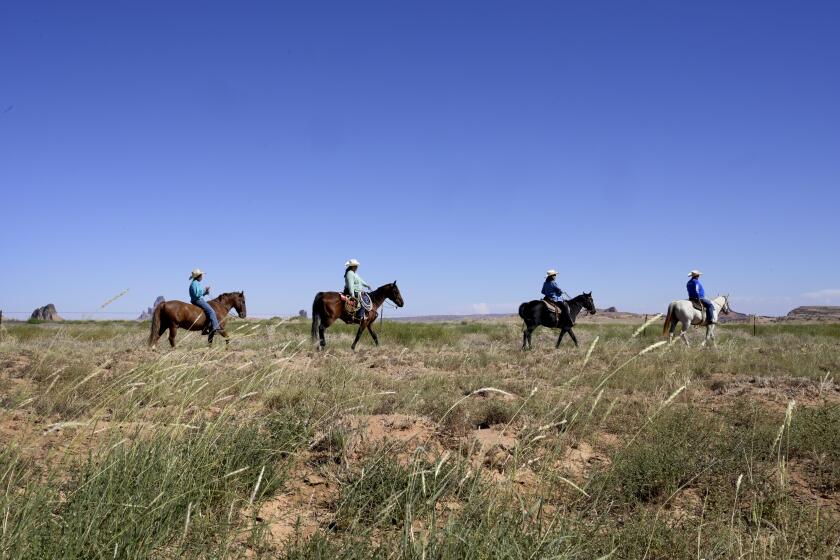Quayle Accuser’s Lawsuit Gets New Life : Politics: Supreme Court to hear appeal of convict who said he was silenced by U.S. officials to stop his story of alleged drug sale.
The Supreme Court agreed Friday to consider reviving a politically charged lawsuit that alleges federal officials conspired on the eve of the 1988 election to silence an inmate who claims to have sold drugs to a young Dan Quayle in the 1970s.
If the justices overturn the lower court, the lawsuit would be cleared for trial, reviving allegations at a time when the former vice president could be campaigning for the 1996 Republican presidential nomination.
No one disagrees that on Nov. 4, 1988, four days before the election, the head of the federal Bureau of Prisons suddenly canceled a press conference by an inmate in an Oklahoma penitentiary.
That evening, Brett Kimberlin, a convicted drug seller, was put in solitary confinement because, prison officials said, “his life was in danger.”
But also threatened was the campaign of George Bush and Dan Quayle. Though ahead in the polls, campaign aides feared an explosive allegation about drug use could heighten doubts about the Republican vice presidential candidate.
Kimberlin’s claims were not widely known before the election. Bush and Quayle won comfortably. Since then, Kimberlin has told his story to many reporters and Quayle has repeatedly denied it.
“Everyone knows Dan Quayle has never met Brett Kimberlin,” Anne Hathaway, a Quayle aide said Friday. “Otherwise, we have no comment.”
Since the incident, Kimberlin has pushed a lawsuit contending that prison Director J. Michael Quinlan and senior Justice Department official Loye Miller violated his rights to free speech and due process of law by putting him in “administrative detention” to prevent him from telling his story.
Two years ago, the U.S. Court of Appeals here, on a pretrial motion, threw out the suit on a 2-1 vote. Judge Karen Lecraft Henderson, a Bush appointee, said that, because Kimberlin had “no direct evidence” that federal officials acted for unconstitutional reasons, the suit could not proceed.
The dissenting judge said that standard is impossible to meet, arguing that only a taped confession by officials involved would amount to direct evidence of an unconstitutional motive.
On Friday, the Supreme Court agreed to hear the appeal in the case (Kimberlin vs. Quinlan, 93-2068). Their ruling will decide an important, if technical issue of law.
“This case will determine how difficult it is to seek vindication in court if a federal official has violated your constitutional rights,” said Howard T. Rosenblatt, a Washington lawyer representing Kimberlin, who is now free on parole.
Judges do not want government officials to undergo the burden of a trial based on loose allegations that they have violated someone’s rights.
For example, many courts have said that plaintiffs must have at least “tangible” or “strong circumstantial” evidence to bolster their claims before a case can proceed to trial. But the U.S. Court of Appeals here adopted the even higher “direct evidence” standard, leading Clinton Administration lawyers to urge the high court to hear Kimberlin’s appeal.
The case also could prove nettlesome for Mark Goodin, who recently signed on as communications director for Quayle. In 1988, he was the deputy communications director for the Bush-Quayle campaign when he called Loye Miller at the Justice Department to say that he was “amazed” to hear “this Kimberlin fellow apparently is going to have a press conference.”
According to the legal complaint, that call set in motion the events leading to the cancellation of the press conference and Kimberlin being put in detention.
Michael Martinez, a lawyer for Miller, said that the claim is “totally frivolous. Regardless of what the Supreme Court does, that will be borne out,” he said.
The justices will hear arguments in the Kimberlin case in April and issue a ruling by July.
More to Read
Get the L.A. Times Politics newsletter
Deeply reported insights into legislation, politics and policy from Sacramento, Washington and beyond. In your inbox three times per week.
You may occasionally receive promotional content from the Los Angeles Times.











